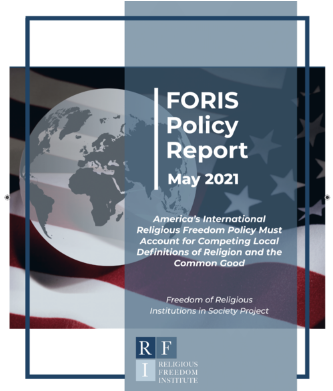In May of 2021, the Religious Freedom Institute released a policy report titled, “America’s International Religious Freedom Policy Must Account for Competing Local Definitions of Religion and the Common Good.” Produced under RFI’s Freedom of Religious Institutions in Society Project (FORIS), an initiative funded by the John Templeton Foundation, this report is the first in a series of three FORIS policy reports published this year. RFI also hosted a webinar in which various themes from the report were explored by two of its authors, Chad Bauman of Butler University and Robert Hefner of Boston University, along with Jaclyn Neo of the National University of Singapore, whose scholarship intersects with many of the report’s themes and recommendations.
Co-authored by Professors Bauman, Hefner, Timur Kuran of Duke University, and Thomas Berg of the University of St. Thomas, the report advances the following arguments:
Proponents of religious freedom who work in U.S. foreign affairs must carefully consider how conceptions of religion and the common good vary across countries. U.S. diplomats, policymakers, and advocates for religious liberty will be less effective if they are unaware of these differences across societies or try to engage at the level of policy only without addressing these more fundamental issues.
Distinctive local understandings of religion help explain various ways governments intervene in internal religious affairs in order to: 1) promote progressive (as opposed to regressive or radical) religion, 2) restrict the political activities of religious actors, particularly insofar as such activities are perceived as competing with or undermining the state, and 3) consolidate religious orthodoxy.
In countries where the state intervenes in favor of what it defines as progressive, non-political, and/or orthodox religion, the institutions of legally disfavored groups are especially vulnerable to discrimination or other maltreatment and merit special consideration. These institutions act in society and can be acted upon. They are inescapably visible and public in nature and, thus, test the limits of religious freedom in a manner that is both deeply complex and urgent.
Local definitions of “the common good” also influence conceptions of the nature and limits of religious liberty. Diverse peoples imagine the good society differently and such differences lead to competing conclusions as to how ideals like liberty and social harmony should be balanced. Countries that privilege religious harmony as a social ideal are inclined to regulate religion in ways that are not consistent with the relatively open religious market in the United States.
The following guidelines can help to promote religious freedom across cultural difference by limiting and orienting state regulation of religion in key ways. Accordingly, religious regulation:
-
Must be evenly and transparently constructed and applied.
-
Should emanate from the principle that religion and its embodiment in religious institutions are a public good.
-
Should generally avoid regulating internal institutional and private religious affairs.
-
Must be chastened by formal recognition of religious freedom as a basic human right (counted among an array of other fundamental rights), and the goal of ensuring maximum freedom for religious individuals and institutions.
The following policy considerations follow from the report’s key observations and guidelines:
-
In devising policy recommendations for the strengthening of personal and institutional religious freedom, U.S. diplomats, policymakers, and advocates must always begin by critically assessing the ways in which different countries and their citizenry define religion.
-
Any effort to promote individual and institutional religious freedom in a specific national setting must begin with a careful mapping of the movements and coalitions most intent on and capable of consolidating religious freedom in a socially effective way.
-
The precise policy terms of institutional religious freedom must be continuously recalibrated and refined in respectful dialogue with citizens and believers across religious communities, and specifically within those societies to which American governmental and nongovernmental policy efforts are directed.
-
We encourage policymakers to advocate boldly for the preservation and expansion of religious liberty for the largest number of religious individuals, communities, and institutions possible, while also advocating for the least intrusive and least coercive forms of religious regulation possible, even in cultural contexts where social harmony is valued as much as, if not more than, religious liberty.
Download and read the full report: America’s IRF Policy Must Account for Competing Local Definitions of Religion and the Common Good.
Other FORIS policy reports:
-
Kuru, Ahmet, Robert Hefner, and Jeremy Barker. “The Intersection of Blasphemy Laws & Institutional Religious Freedom: Egypt, Indonesia, Pakistan, and Turkey.”
THE RFI BLOG

Is Egypt’s Government Trying To Take Over Christianity’s Most Important Monastery?

Does Southeast Asia Lead the World in Human Flourishing?

RFI Leads Training Session on Religious Freedom Law and Policy for U.S. Army War College

Oral Argument in Charter School Case Highlights Unconstitutional Motives Behind OK Attorney General’s Establishment Clause Claim

Largest Longitudinal Study of Human Flourishing Ever Shows Religion’s Importance
CORNERSTONE FORUM

Reaffirming Religious Freedom: Bridging U.S. Advocacy and Iraq’s Constitutional Framework

Political Polarization, Same-Sex Marriage and Religious Liberty

Bridging the Gap Between International Efforts and Local Realities: Advancing Religious Freedom in the MENA Region

Challenges to Religious Freedom in Iraq and the Critical Need for Action


